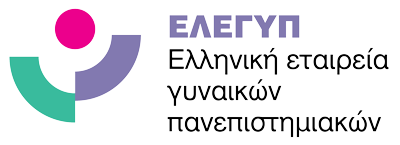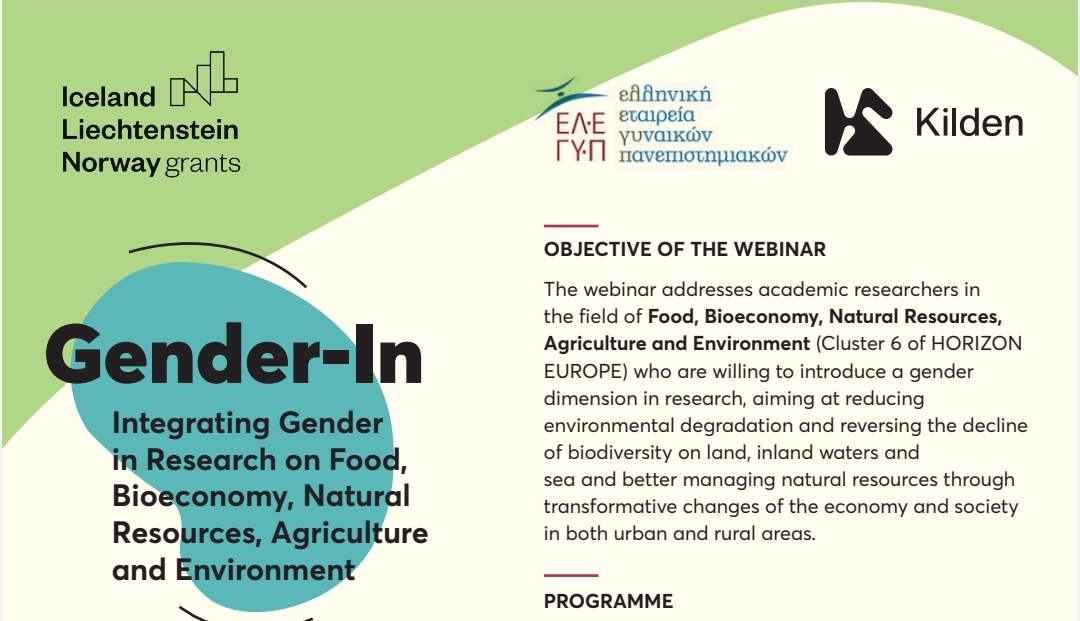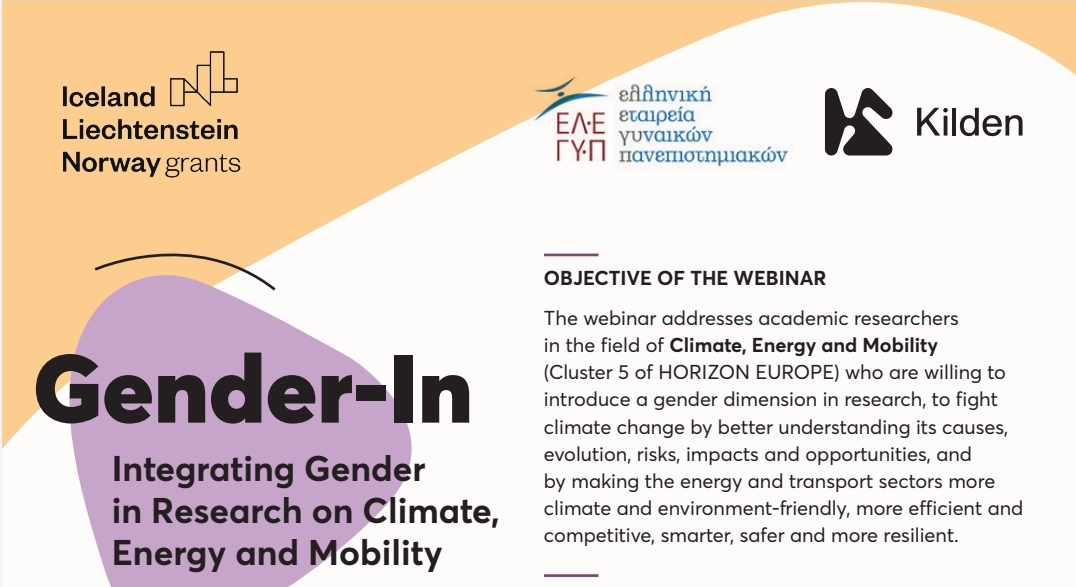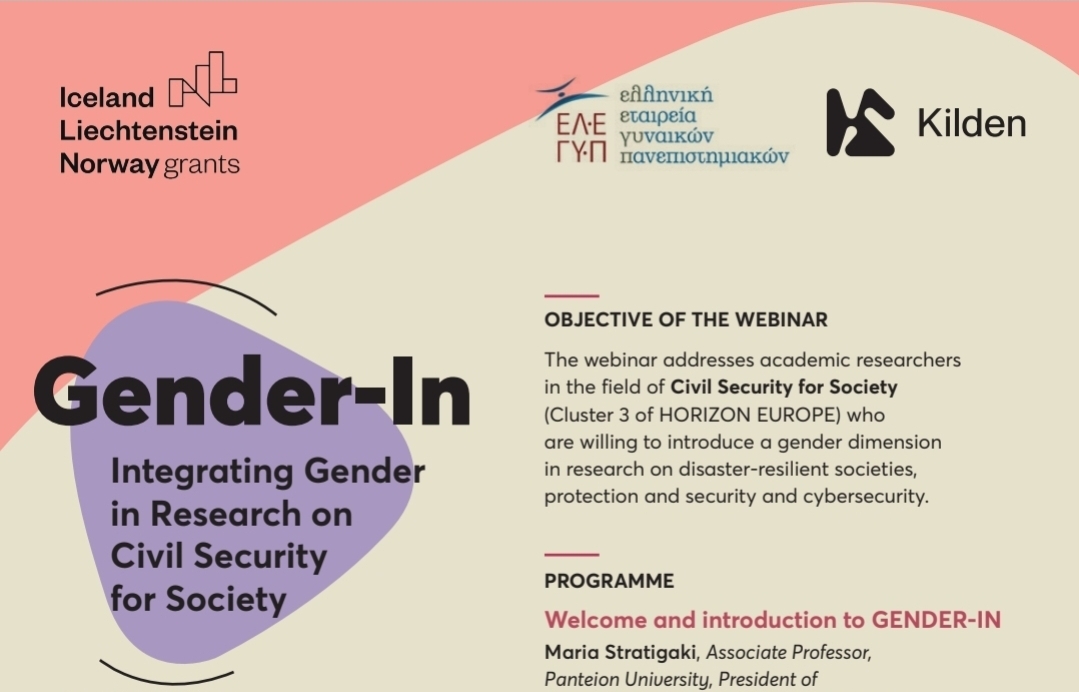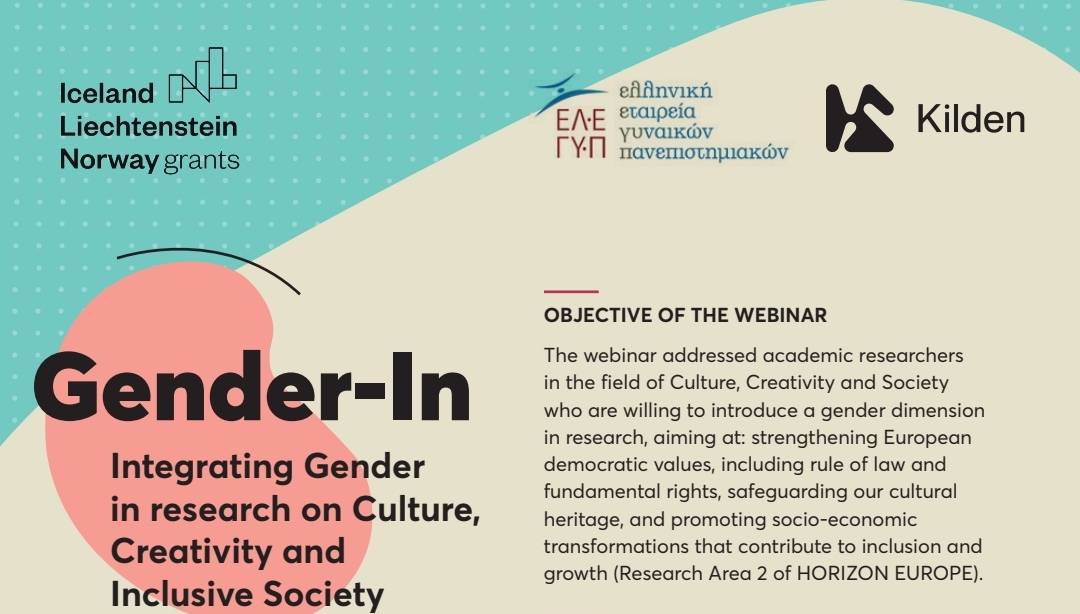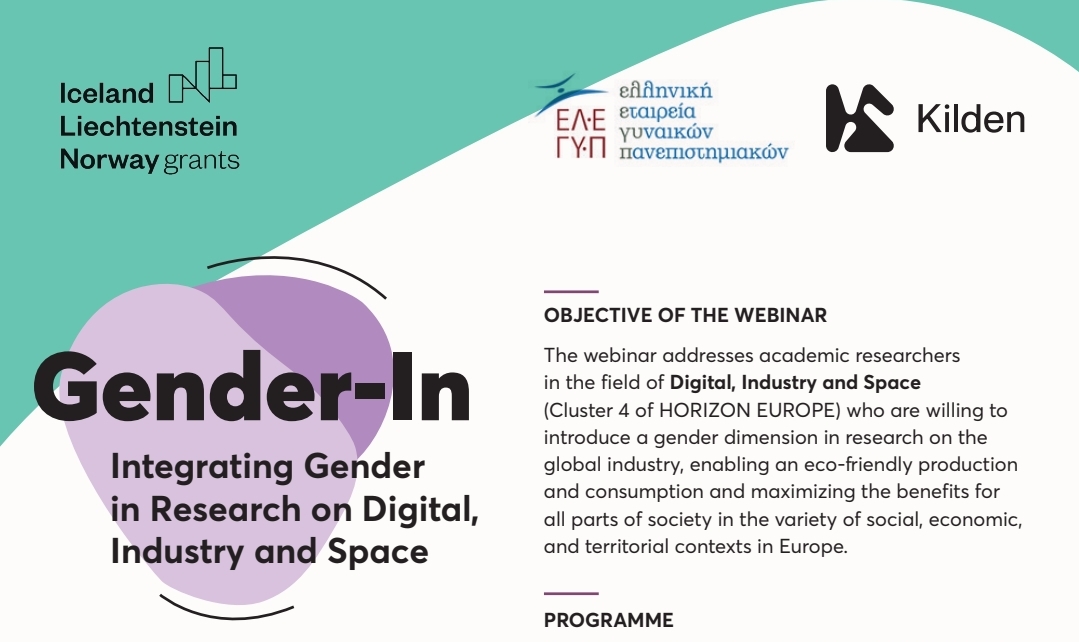Gender-In

GENDER-IN: Integrating Gender in interdisciplinary research
The project enhances mutual learning process between scholars and researchers in two countries (Norway and Greece) on the integration of a gender perspective in research. This task recently became a requirement of the EU funding mechanisms with the view in improving the quality of research and its excellence.
The project has worked on the 6 different interdisciplinary research areas by the Horizon-Europe as follows:
1.Health: It aims to include improving and protecting the health and well-being of citizens of all ages by generating new knowledge, developing innovative solutions and integrating where relevant a gender perspective to prevent, diagnose, monitor, treat and cure diseases. Further aims include developing health technologies, mitigating health risks, protecting populations and promoting good health and well-being in general and at work.
2.Culture, Creativity and Inclusive Society: It aims to strengthen European democratic values, including rule of law and fundamental rights, safeguarding our cultural heritage, and promoting socio-economic transformations that contribute to inclusion and growth.
3.Civil Security for Society: It responds to the challenges arising from persistent security threats, including cybercrime, as well as natural and man-made disasters.
4.Digital, Industry and Space: It aims to a European industry with global leadership in key areas, enabling production and consumption to respect the boundaries of our planet, and maximizing the benefits for all parts of society in the variety of social, economic and territorial contexts in Europe.
5.Climate, Energy and Mobility: It aims to fight climate change by better understanding its causes, evolution, risks, impacts and opportunities, and by making the energy and transport sectors more climate and environment-friendly, more efficient and competitive, smarter, safer and more resilient.
6.Food, Bioeconomy, Natural Resources, Agriculture and Environment: It aims at reducing environmental degradation and reversing the decline of biodiversity on land, inland waters and sea and better managing natural resources through transformative changes of the economy and society in both urban and rural areas. It will ensure food and nutrition security for all within planetary boundaries through knowledge, innovation and digitalisation in agriculture, fisheries, aquaculture and food systems and steer and accelerate the transition to a low carbon, resource efficient circular economy and sustainable bioeconomy, including forestry.
The project has organised webinars addresses: (a) academic researchers and (b) policy makers and (c) the civil society.
The general scope of the project is here.
Main Activities:
1) FINAL CONFERANCE
The Greek Association of Academic Women (ELGYP) in close collaboration with Centre of Gender Studies of Panteion University orginized a final conferance entitled: Integrating Gender in Interdisciplinary Research.
The conferance was held on Tuesday 07 November 2023 at Panteion University and you can see more information about the conferance programme here.
2) LIVE WORKSHOPS (6-7 November in Athens)
Gender-In invited researchers and academics who wish to develop their skills in the integration of the gender dimension in research to participate in live workshops Athens in November 2023. In the workshops, researchers had the opportunity to discuss ways of identifying, analyzing and benefiting from the gender aspects of their research plans.
The workshops were held in Athens (06-07 November 2023). Each session was dedicated to interdisciplinary research areas as outlined in the clusters of Horizon-Europe. Participants could apply for one or more sessions.
The live workshops was build on the Gender-In webinar series Integrating Gender in interdisciplinary research but with a more participatory approach, including groupworks on how to include the gender dimension in the participants' research projects. The workshops were facilitated by Trine Rogg Korsvik from Kilden genderresearch.no, in collaboration with ELEGYP.
Live Workshops Programme
Monday 06 November (10.00—13.00): Health
The session addressed the relevance of the gender dimension in research topics in cluster 1 Health in Horizon Europe. This cluster aims to improving and protecting the health and well-being of citizens of all ages by generating new knowledge, developing innovative solutions and integrating where relevant a gender perspective to prevent, diagnose, monitor, treat and cure diseases. Further aims include developing health technologies, mitigating health risks, protecting populations and promoting good health and well-being in general and at work.
Venue: Biomedical Research Foundation Academy of Athens(BRFAA) (Soranou Ephessiou 4 Street, Athens 115 27)
Monday 06 November (15.00—18.00): Food, Bioeconomy, Natural Resources, Agriculture and Enviroment
The session addressed the relevance of the gender dimension in research Cluster 6 Food, Bioeconomy, Natural Resources, Agriculture and Environment. Cluster 6 aims at reducing environmental degradation and reversing the decline of biodiversity on land, inland waters and sea and better managing natural resources through transformative changes of the economy and society in both urban and rural areas.
Venue: Agricultural University of Athens (Iera Odos 75, Athens 118 55)
Tuesday 07 November (15.00—18.00): Culture, Creativity and Inclusive Society
The session addressed the relevance of the gender dimension in cluster 2 Culture, Creativity and Inclusive society. Cluster 2 aims to strengthen European democratic values, including rule of law and fundamental rights, safeguarding our cultural heritage, and promoting socio-economic transformations that contribute to inclusion and growth.
Venue: Athens University of Economics and Business (28th of October 76, Athens 104 34)
The workshops were participatory and had been tailored for the participants. Applicants were thus required to send a letter of motivation in which they were explaining their expectations, what they wanted to learn more about and topics they liked to discuss (e.g. theories, concepts, methodologies…).
Applicants must been familiar with the relevant topics of the Gender-In webinar series.
Registration Form: https://elegyp.gr/el/gender-in-webinar-registration
Participation was free of charge.
Certificates of attendance had been provided to participants.
Preparation
Once accepted, participants received a reading list with relevant literature. Participants had been asked to prepare a short (5 minutes) presentation of their research to share with the other participants. The presentation should have included questions on how the gender dimension is relevant in their research.
3) LIVE WORKSHOPS (8-9.05.2023 in Thessaloniki and 11-12.05.2023 in Athens)
Gender-In invited researchers and academics who wish to develop their skills in the integration of the gender dimension in research to participate in live workshops in Thessaloniki and Athens in May 2023. In the workshops, researchers had the opportunity to discuss ways of identifying, analyzing and benefiting from the gender aspects of their research plans. The workshops were held in Thessaloniki (8-9 May 2023) and in Athens (11-12 May 2023). Each day had a morning session and an afternoon session dedicated to one interdisciplinary research area as outlined in the clusters of Horizon-Europe. Participants could apply for one or more sessions. The content of the workshops was similar in Thessaloniki and Athens. The live workshops were build on the Gender-In webinar series Integrating Gender in interdisciplinary research but with a more participatory approach, including groupworks on how to include the gender dimension in the participants' research projects. The workshops were facilitated by Linda Maria Rustad and Trine Rogg Korsvik from Kilden genderresearch.no, in collaboration with ELEGYP. The workshops took place at the Aristotle University of Thessaloniki (10th floor of Department of Education, Thessaloniki University) and Impact Hub in Athens (Karaiskaki 28, Athens 105 54).
Live Workshops Programme
Day 1: 8 May in Thessaloniki / 11 May in Athens
Morning session (9.30—13.00): Health
The session addressed the relevance of the gender dimension in research topics in cluster 1 Health in Horizon Europe. This cluster aims to improving and protecting the health and well-being of citizens of all ages by generating new knowledge, developing innovative solutions and integrating where relevant a gender perspective to prevent, diagnose, monitor, treat and cure diseases. Further aims include developing health technologies, mitigating health risks, protecting populations and promoting good health and well-being in general and at work.
Afternoon session (14.30—18.00): Social inclusion, participation, and democracy
The session addressed the relevance of the gender dimension in cluster 2 Culture, Creativity and Inclusive society and cluster 3 Civil security for society. Cluster 2 aims to strengthen European democratic values, including rule of law and fundamental rights, safeguarding our cultural heritage, and promoting socio-economic transformations that contribute to inclusion and growth. Cluster 3 responds to the challenges arising from persistent security threats, including cybercrime, as well as natural and man-made disasters.
Day 2: 9 May in Thessaloniki / 12 May in Athens
Morning session (9.30—13.00): Technology, industrial production, work
The session addressed the relevance of the gender dimension in research topics in Cluster 4 Digital, Industry & Space. This cluster aims to shape competitive and trusted technologies for a European industry with global leadership in key areas, enabling production and consumption to respect the boundaries of our planet, and maximising the benefits for all parts of society. One of the expected impacts of Cluster 4 is a human-centred and ethical development of digital and industrial technologies, through a two-way engagement in the development of technologies, empowering end-users and workers, and supporting social innovation.
Afternoon session (14.30—18.00): Environment and climate
The session addressed the relevance of the gender dimension in research topics in Cluster 5 Climate, Energy and Mobility and Cluster 6 Food, Bioeconomy, Natural Resources, Agriculture and Environment. Cluster 5 aims to fight climate change by better understanding its causes, evolution, risks, impacts and opportunities, and by making the energy and transport sectors more climate and environment-friendly, more efficient and competitive, smarter, safer and more resilient. Cluster 6 aims at reducing environmental degradation and reversing the decline of biodiversity on land, inland waters and sea and better managing natural resources through transformative changes of the economy and society in both urban and rural areas.
The workshops were participatory and had been tailored for the participants. Applicants were thus required to send a letter of motivation in which they explain their expectations, what they wanted to learn more about and topics they liked to discuss (e.g. theories, concepts, methodologies…).
Applicants should have been familiar with the relevant topics of the Gender-In webinar series.
Registration Form: https://elegyp.gr/el/gender-in-webinar-registration
Participation was free of charge.
Certificates of attendance had been provided to participants.
Preparation
Once accepted, participants received a reading list with relevant literature. Participants had been asked to prepare a short (5 minutes) presentation of their research to share with the other participants. The presentation included questions on how the gender dimension is relevant in their research.
4) WEBINARS (24.10.2022-13.03.2023)
1. Health (24 October 2022)
•Johanne Sundby, Medical Doctor, Specialist in OB/GYN, Professor in Global Reproductive Health. Gender, women and reproductive health-in a development perspective
•Christina Dalla, Associate Professor, Dep. Of Pharmacology, Medical School, National and Kapodistrian University of Athens. Principal Investigator Neuropsychology Group. How can we incorporate sex and gender in preclinical and clinical research?
2.Culture, Creativity and Inclusive Society (21 November 2022)
•Martha Michailidou, Assistant Professor,Department of Communication, Media and Culture, Panteion University. Gender in media and cultural studies research
•Hilde Herming, curator and manager of the Women's Museum Norway. The Women's Museum Norway
3.Civil Security for Society (12 December 2022)
•Matina Papagiannopoulou, social researcher, criminologist, PhD candidate, Panteion University. Gender Issues and Challenges in Researching Human Trafficking Issues
•Torunn L. Tryggestad, Deputy Director, Director of the PRIO Centre on Gender, Peace and Security. Integrating gender in peace and conflict research: the case of PRIO
4.Digital, Industry and Space (23 January 2023)
•Nancy Papalexandris, economist, Emeritus Professor, Economic University of Athens. Gender Equality in European firms: the link with sustainable development
•Roger A. Søraa, Associate professor at the Department of Interdisciplinary Studies of Culture (KULT). Automating and gendering of work(ers)
5.Climate, Energy and Mobility (13 February 2023)
•Efi Tritopoulou, Senior Researcher, President of the NGO NoWaste21, President of the Greek Women’s Engineering Association (EDEM).
•Panagiota Rouni, Mechanical Engineering School, National Technical University of Athens. Gender in Circular Economy, Environmental sciences and Engineering
•Karina Standal, Senior Researcher at CICERO - Center for International Climate Research. Gender in the energy transition
6.Food, Bioeconomy, Natural Resources, Agriculture and Environment (13 March 2023)
•Theodosia Anthopoulou, Professor, Department of Social Policy, Geographer Panteion University.
•Maria Partalidou, Associate Professor, Dep.of Agricultural Economics, Laboratory of Rural Sociology and Agricultural Extensions Aristotle University of Thessaloniki. Gender and Rural Studies: focusing on food and agricultural change
•Aase Kristine Lundberg, Researcher at Nordlandsforskning. Gender and nature management
5) REPORTS
Six reports based on the six interdisciplinary thematic areas of Horizon-Europe have been written:
1) Integrating Gender in Health Research, Pavlina Pavlidi, phD candidate in Neuropsychopharmacology, National and Kapodistrian University of Athens
2) Integrating Gender in Culture, Creativity and Inclusive Society Research, Ismini Sioula-Georgoulea, phD candidate in Social Policy, Panteion University
3) Integrating Gender in Civil Security for Society Research, Thanasis Theofilopoulos, phD candidate in Social Policy, Panteion University
4) Integrating Gender in Digital, Industry and Space Research, Dr. Irene Zografou, Athens University of Economics and Business, School of Business, Department of Marketing and Communication
5) Integrating Gender in Climate, Energy and Mobility Research, Areti Provata, Communication Consultant
6) Integrating Gender in Food, Bioeconomy, Natural Resources, Agriculture and Environment Research, Chrysanthi Charatsari, Postdoctoral Researcher in Agriculture, Aristotle University of Thessaloniki
•Torunn L. Tryggestad, Deputy Director, Director of the PRIO Centre on Gender, Peace and Security. Integrating gender in peace and conflict research: the case of PRIO
Hilde Herming, curator and manager of the Women's Museum Norway. The Women's Museum Norway
